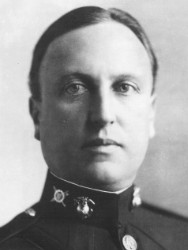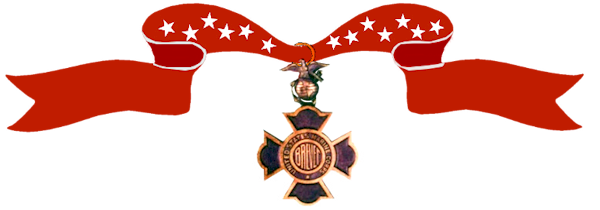David Porter came from a well-known and highly regarded family with a six-generation history of military service. His great-grandfather was Navy Commodore David Porter of the Barbary War and the War of 1812. His grandfather, David Dixon Porter, was a Naval hero of the Civil War and Superintendent of the U.S. Naval Academy. His father was a Marine Corps Lieutenant Colonel. David Porter earned the Medal of Honor and the Brevet Medal during service in the Philippine Islands during the insurrection there. He retired in 1942 and was promoted to Major General on the retired list.

–
Cemetery:
Awards Received
-

Marine Corps Brevet Medal
-

Medal of Honor
-
Marine Corps Brevet Medal
Service:
United States Marine CorpsRank:
First LieutenantBatallion:
2d Battalion of MarinesAction Date:
October 8, 1899
Marine Corps Orders No. 26 (June 27, 1921)The Secretary of the Navy takes pleasure in transmitting to First Lieutenant David Dixon Porter, United States Marine Corps, the Brevet Medal which is awarded in accordance with Marine Corps Order No. 26 (1921), for distinguished conduct and public service in the presence of the enemy while serving with the Second Battalion of Marines, at Novaleta, Philippine Islands, on 8 October 1899. On 28 March 1901, First Lieutenant Porter is appointed Captain, by brevet, to rank from 8 October 1899.
-
Medal of Honor
Service:
United States Marine CorpsRank:
Colonel [then Captain ]Regiment:
1st Regiment (Marines), 1st Marine BrigadeAction Date:
November 17, 1901
The President of the United States of America, in the name of Congress, takes pleasure in presenting the Medal of Honor to Colonel [then Captain ] David Dixon Porter, United States Marine Corps, for extraordinary heroism and eminent and conspicuous conduct in battle while serving with the 1st Regiment (Marines), 1st Marine Brigade, in action at the junction of the Cadacan and Sohoton Rivers, Samar, Philippine Islands, on 17 November 1901. In command of the columns upon their uniting ashore in the Sohoton Region, Colonel Porter made a surprise attack on the fortified cliffs and completely routed the enemy, killing 30 and capturing and destroying the powder magazine, 40 lantacas (guns), rice, food and cuartels. Due to his courage, intelligence, discrimination and zeal, he successfully led his men up the cliffs by means of bamboo ladders to a height of 200 feet. The cliffs were of soft stone of volcanic origin, in the nature of pumice and were honeycombed with caves. Tons of rocks were suspended in platforms held in position by vines and cables (known as bejuco) in readiness to be precipitated upon people below. After driving the insurgents from their position which was almost impregnable, being covered with numerous trails lined with poisoned spears, pits, etc., Colonel Porter led his men across the river, scaled the cliffs on the opposite side, and destroyed the camps there. He and the men under his command overcame incredible difficulties and dangers in destroying positions which, according to reports from old prisoners, had taken three years to perfect, were held as a final rallying post, and were never before penetrated by white troops. Colonel Porter also rendered distinguished public service in the presence of the enemy at Quinapundan River, Samar, Philippine Islands, on 26 October 1901.

